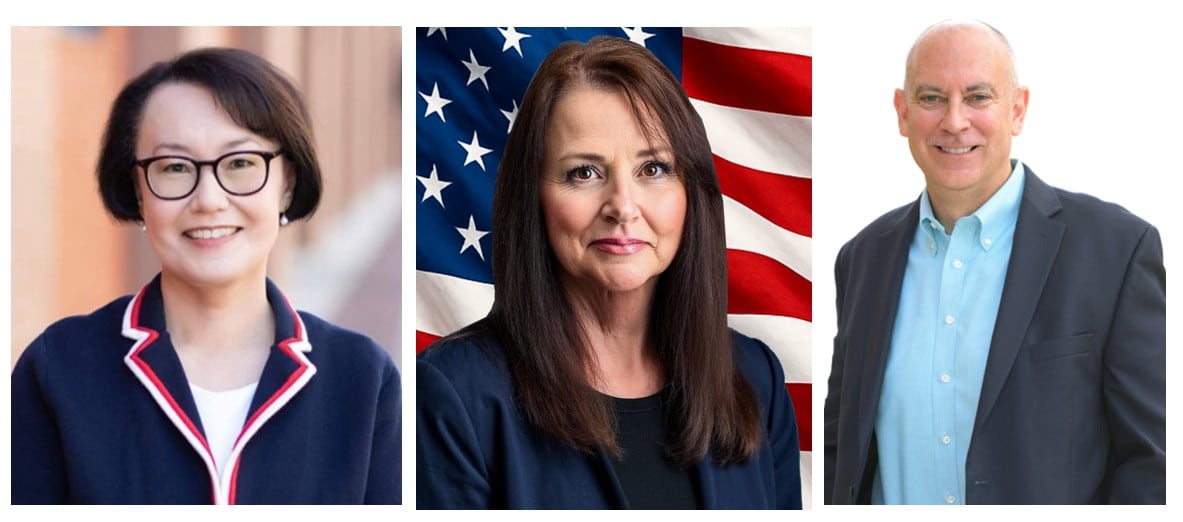Three candidates are vying to be Madison, Alabama’s next mayor. In order to spend more time with his family, Mayor Paul Finley declared in October 2024 that he will not run for a fourth term.
Having been mayor intermittently since 2008, Finsley chose not to run for reelection in 2012 but was elected again in 2016 and 2020.
Steve Smith, M. Margi Daly, or Ranae Bartlett are the candidates for the role. The most urgent issues facing the city must be addressed by the winner.
On August 26, there will be city elections.
The same ten questions were posed to each contestant. The following answers have been edited for grammar:
How did your previous roles and background prepare you to lead Madison?
Madison City Council President Pro Tempore Ranae Bartlett:What makes me unique is my varied experience. Since joining the City Council in 2020, I have held the positions of President Pro Tempore, Council President, and Chair of the Finance Committee, which has given me a thorough understanding of Madison’s operations. I received the All State School Board award in 2020 because of my ability to proactively plan for expansion and handle sizable budgets during my time on the school board. My legal experience, which includes working as Assistant General Counsel for Wal-Mart Stores and as a clerk for the Chief Judge of the U.S. Court of Appeals for the Fifth Circuit, sharpened my ability to precisely handle challenging situations. I’ve developed community initiatives like the Madison City Chess League as a nonprofit leader, encouraging participation and instruction. My background in public service, professionalism, and voluntarism has equipped me to serve as mayor of this city.
M. Margi Daly: In my former city, which had three times our population, I was elected three times. Over the past three years, I have attended more Council meetings than any other elected person.
Steve SmithI’ve worked in Madison for almost five years, having held positions as Council President, Finance Chair, City Administrator, and two-term City Councilman. I’ve directed infrastructure projects, managed budgets, and worked closely with locals on matters that are most important, such as parks, schools, and public safety and traffic. I’ve learned the value of customer service and financial responsibility from my experience as a small company owner, and I’ve lived here for more than 30 years, so I have a thorough awareness of the needs and values of our community. I’ve been contributing to Madison’s success for decades, so I know how it operates.
What do you consider your most significant accomplishment to date, and how will it guide your city leadership?
Bartlett: I was the first person in my family to complete high school, and I grew up in a humble home. By taking on several jobs and applying for scholarships, I was able to graduate debt-free from both law school and college. I learned from this experience to be frugal with my money and to avoid taking on too much debt. I pushed for the city to hire an outside financial advisor to assist city officials in assessing the financial ramifications prior to making significant decisions when I was first elected to the Madison City Council in 2020. It was long overdue and the first time the city had ever employed a professional of this kind.
Daly: With 73% of the vote, I won the election by educating the populace about the oppression of a city manager government. I’ll prioritize locals over special interests. I’m not connected to any NGOs or special interests.
Smith: Working with Mayor Paul Finley and our city staff to implement strategic improvements in public safety and infrastructure that have made Madison one of Alabama’s safest and most desirable cities is one of my proudest achievements. This experience reaffirmed that planning, cooperation, and resident listening are the keys to progress. As mayor, I’ll keep up my balanced leadership style by attending to immediate demands while making plans for long-term expansion.
What s something unique you bring to this position?
Bartlett: I can effectively speak, negotiate, and represent the city because of my legal expertise.
Daly: I only have constituents to answer to; I don’t have any special interest funding. My first concern will be the residents’ health and safety.
Smith: I offer a blend of extensive local knowledge and advanced municipal management expertise. I’ve been in the trenches resolving Madison’s problems, so I’m not learning it from the outside. Being an administrator and a policymaker has given me a unique viewpoint.
What do you think is the biggest problem facing Madison in 2025?
Bartlett: Development. Compared to other parts of Alabama, this entire region is increasing at the fastest rate. In order to appropriately manage expansion and guarantee that we receive our fair share of state assistance, Madison must collaborate with Huntsville, Madison County, and Limestone County. As Space Command, the FBI, and other federal assets grow here, that means concentrating on infrastructure, schools, and roadways.
Daly: The $1,270,000,000 that present and future taxpayers owe will be paid up in 2054. The ongoing waste and borrowing will end. I discovered this secret debt when I went to the annual audit. Nothing will be kept a secret from the inhabitants; I will post all expenditures and debt on our website.
Smith: Development. Although Madison’s quick growth is exhilarating, it also brings with it problems like traffic jams, the cost of housing, and strain on the infrastructure. Growth cannot be stopped, but it can be carefully controlled. Planning ahead will be crucial to maintaining Madison’s unique features while ensuring that our public services, infrastructure, and standard of living stay up.
Madison s rapid population and economic growth present major infrastructure pressures. How would your administration manage traffic congestion and aging infrastructure?
BartlettIn order to manage traffic congestion and aging infrastructure, planning and wise decision-making are essential. When we have continued to build subdivisions on two-lane roads without a strategy or the capacity to extend them, we have created some of our own problems. This must end. Project cost sharing requires partnerships with Huntsville and Madison County, and Slaughter Road is one of the best examples I can think of where we are accomplishing that. Additionally, Madison must collaborate with Limestone County to identify opportunities for joint initiatives that benefit both of our communities. We need to make data-driven decisions that prioritize road projects with the greatest impact on residents time spent in their vehicles.
Even though it can be difficult to finance infrastructure projects, I reject tax increases. Taxes paid by Madison citizens are sufficient, yet none of the funds sent to Montgomery or Washington, DC, end up back in North Alabama. In order to assist our entire region in constructing the infrastructure required for the expected expansion from Space Command and the Golden Dome, we must actively promote and campaign for state and federal financing.
Daly: To prioritize road upgrades, I’ll work with locals and city employees. I ll hire a Public Works night crew with proper lighting to avoid traffic disruptions during peak hours. I won t close multiple main arteries simultaneously. An app will be added with traffic alerts and train warnings. This will start on day 1 not left till 4 months before the next election.
Smith:I will fight for state and federal infrastructure funding, invest in targeted road expansions, and fix known choke points. I ll also work with regional partners to ensure our traffic planning aligns with broader development. At the same time, we ll address aging infrastructure with a long-term maintenance schedule so we re not just building new roads we re taking care of the ones we have.
How would you manage other issues that come from growth, like governing a growing population, rising costs to buy a home, etc.?
Bartlett:Growth is both exciting and challenging. My management style is collaborative, and I recognize that Madison is part of a region that is experiencing many of the same challenges from growth. Solutions can involve collaborating to lower the costs of shared services and taking advantage of the economies of scale in purchasing. The key to collaboration is building trust and relationships with other leaders.
Daly:I ve worked in a government three times our size, so it ll be easy. I ll request that the new Council remove the grocery tax. I ll dedicate current employees to constituent services, assisting with property tax appeals and ensure all State and Federal assistance programs are available.
Smith:Managing growth means balancing development with livability. I ll work to ensure we have the infrastructure, schools, and public safety resources needed to support a larger population. On housing, we need policies that encourage diverse housing options so young families, retirees, and working professionals can all afford to call Madison home.
How will you balance fiscal responsibility with necessary investments like infrastructure, parks, and schools within the city s budget?
Bartlett:Fiscal responsibility and the debt load the city is carrying is among the top concerns of residents. At the same time, residents want to see recreational opportunities improve and green spaces expand, and they appreciate that Madison is a safe place to live and raise a family. It s important for Madison to live within its means, and with comprehensive planning, Madison can stay on track for success.
Daly:The debt of $1,270,000,000 owed by current and future residents through 2054 won t be added to. Schools will be receiving plenty of federal/State funds; we only need to utilize them correctly.
Smith:We will prioritize needs based on long-term strategic planning, not short-term politics. That means continuing responsible budgeting practices, protecting dedicated revenue for schools, and seeking outside funding wherever possible. Every investment will be weighed against its return for residents whether that s in safety, quality of life, or economic stability.
Would you revisit the possibility of bringing on a city manager?
Bartlett:No. The voters overwhelmingly rejected the proposal to have a council-manager form of government. That decision should be final.
Daly:No, I was the main reason the community was educated on this totalitarian type of government that silenced the voters voices.
Smith:I do not support revisiting the city manager issue. A recent attempt, driven by an outside group, cost our city over $20,000 without delivering a benefit to residents. Madison is best served by a mayor directly accountable to its people, not by an unelected administrator influenced by outside interests.
How have you directly engaged with residents during your campaign? How will you do that during your time as mayor to address concerns before they escalate?
Bartlett:I have canvassed neighborhoods meeting residents in their home, attended meet-and-greets and forums, returned emails, and talked to residents on the phone. I plan to be out in the community and at local businesses, not just in my office at City Hall. Leadership is being present and listening intently, and I will maximize opportunities to be with the people who elect us to serve. I also plan to distribute a newsletter that highlights the things we are working on for the residents of Madison.
Daly:I ve been educating our community about our debt and how special interests were prioritized over the community s well-being. I ll be available daily, have an open-door policy, and a constituent-friendly City Hall. I ll live-stream all meetings with a public comment section on Zoom.
Smith:Throughout my campaign, I ve been out in neighborhoods, meeting residents where they are at community events, in local businesses, and at their front doors. Listening is the most important part of leadership. As Mayor, I ll hold regular town halls, maintain open office hours, and use multiple communication platforms so residents can share their concerns.
What main concerns are you hearing from residents? How will you address them?
Bartlett:Residents have told me over and over that their top concern is the lack of infrastructure to handle the explosive growth our city has experienced. This results in traffic congestion negatively impacting the quality of life for residents. I will use our comprehensive plan to manage growth and improve our infrastructure which ensures Madison is moving responsibly into the future.
Daly:The main concerns are roads, traffic, infrastructure, maintaining state school rankings, and raising national standards. The current administration is diminishing parental rights by avoiding informing parents in trauma situations. An MPD policy allows for avoiding notifying parents or guardians, putting the NGO over parents. Infrastructure and traffic issues will be prioritized, with hiring consultants halted and public works expanded with a night shift. I ll request the council to change the policy from may to must inform parents or guardians, as I requested when the policy was approved by the current council.
Smith:The top concerns I hear are traffic congestion, school capacity, and maintaining quality of life as we grow. My plan directly addresses these: a multi-phase traffic improvement strategy, protecting and expanding school funding, and investing in parks, recreation, and public safety. By focusing on these priorities, we can ensure Madison remains a great place to live, work, and raise a family.






